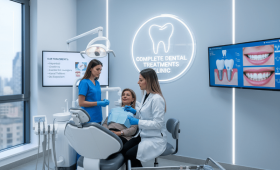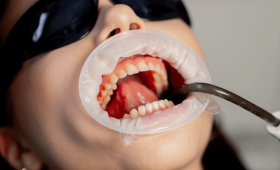What Is a Dental Implant and Why Is It Preferred?
A dental implant is an artificial tooth root made of titanium that is placed into the jawbone to replace missing teeth. It fuses with the jawbone to form a stable foundation, and structures such as crowns, bridges, or dentures are placed on top. This treatment method is frequently preferred because it offers the most natural-looking aesthetic results, does not harm neighboring teeth, and fully restores chewing functions. Dental implants significantly improve patients’ oral health and quality of life.
Why Are Dental Implant Prices More Affordable in Croatia?
The primary reasons for the more affordable dental implant prices in Croatia compared to other Western European countries include lower living and operating costs. Lower labor costs and competition in the healthcare sector allow clinics to offer cost-effective pricing. Furthermore, Croatia’s membership in the European Union and its proximity to Western Europe make it an attractive option for patients seeking an economical solution without sacrificing quality.
What Factors Affect Implant Prices in Croatia?
The most important factors affecting implant prices in Croatia are the brand of the implant used (premium, mid-range, or budget segment), the number of implants to be applied, and whether additional procedures (bone grafting, sinus lifting, etc.) are needed. The dentist’s experience, the clinic’s location, and the technology used are also decisive factors in the cost. A detailed pre-treatment examination allows for a precise price quote that takes all these factors into account.
What Are the Popular Implant Brands in Croatia?
Dentists in Croatia generally prefer internationally recognized and quality-proven implant brands. These brands include premium ones like Nobel Biocare, Straumann, and Astra Tech, as well as more affordable but reliable brands like Neodent or Megagen. The dentist determines the most suitable brand based on the patient’s bone structure, budget, and expectations. The use of these brands guarantees the quality and longevity of the treatment.
Is It Safe to Travel to Croatia for Dental Implant Treatment?
Yes, traveling to Croatia for dental implant treatment is generally safe. The country complies with the strict health standards and regulations of the European Union. Dental clinics, especially in major cities like Zagreb, Split, and Rijeka, have modern equipment and dentists who have received international training. However, it is important to check the clinic’s accreditations and patient reviews before planning your trip. Croatia is also a safe and hospitable tourist destination.
How Long Does Dental Implant Treatment Take?
Dental implant treatment generally consists of several stages and can take a total of several months. In the first stage, the implant is placed into the jawbone. A healing period of 3 to 6 months is expected for the implant to fuse with the bone. In the second stage, a prosthesis or crown is placed on the implant. In some cases, quick solutions like “same-day implants” may also be offered, but this depends on the patient’s specific condition.
What Can Be Included in the Implant Price in Croatia?
The implant price in Croatia, although it varies by clinic, generally includes the implant itself, the surgical procedure, and the abutment (connection piece) to be placed on the implant. Some clinics may also include additional services such as the initial consultation, X-rays, and tooth extraction in the package. For international patients, all-inclusive packages may also include additional services such as accommodation and airport transfers. It is essential to ask what is included when getting a price quote.
Does the Bone Grafting (Bone Powder) Procedure Affect the Price?
Yes, the bone grafting procedure can significantly increase the total cost of implant treatment. This procedure is performed when there is insufficient bone volume for the implant to be placed. Bone grafting is a necessary step for the implant to successfully integrate. The price of this procedure varies depending on the amount and type of graft material to be used. It is important to consider this additional cost during treatment planning.

Which Cities Are Popular for Implant Treatment in Croatia?
The most popular cities for implant treatment in Croatia are Zagreb, Split, Rijeka, and Zadar. Zagreb, as the country’s capital, has the widest range of clinics and specialists. Split and Rijeka, located on the Adriatic coast, allow patients to combine treatment with a holiday. These cities stand out with their modern clinics, experienced dentists, and easy access.
Is Pain Felt During Implant Treatment?
During implant treatment, the patient does not feel any pain or discomfort because dentists use local anesthesia. The procedure is generally quite comfortable. After the anesthesia wears off, a slight pain or discomfort may be felt, but this can usually be easily managed with painkillers. Side effects such as swelling and bruising may also occur, but they disappear within a few days.
What Should Be Considered When Choosing a Dentist in Croatia?
When choosing a dentist in Croatia, the dentist’s experience and expertise, the clinic’s accreditations, and hygiene standards are the most important criteria. It is important to examine the dentist’s portfolio showing previous implant cases, read patient reviews, and get information about the implant brands used. It is also useful to ask if there is an English-speaking staff or interpreter to avoid any communication problems.
How Do Prices in Croatia Compare to Ukraine and Turkey?
Dental implant prices in Croatia are generally slightly higher than in Ukraine and Turkey. The main reason for this is that Croatia’s overall economic level is higher than in those countries. However, Croatian prices are still much more economical than in Western European countries like the UK, Germany, or Italy. Croatia offers a good middle ground in terms of price-performance balance.
What Materials Are Used in Implant Application?
Dental implants are usually made of titanium, a bio-compatible metal. Titanium is the most preferred material for implant treatment because the possibility of being rejected by the human body is very low. In some cases, zirconium can also be used, but titanium is more common and has a proven success rate. The crowns or prostheses placed on the implant can be made of materials such as porcelain, zirconium, or metal-supported porcelain.
Does Sinus Lifting (Sinus Lift) Affect Prices?
Yes, the sinus lifting procedure is a surgical procedure applied to patients with insufficient bone volume in the upper jaw and increases the total cost of the implant treatment. This procedure raises the sinus cavity to allow for new bone formation so that the implant can be safely placed. The cost varies depending on the complexity of the procedure. If the patient’s condition requires this procedure, its inclusion in the treatment plan is inevitable.
What Is the Success Rate of Dental Implant Treatment?
The success rate of dental implant treatment is over 95% when done with proper planning, an experienced dentist, and high-quality implant materials. Factors affecting success include the patient’s general health status, bone quality, and adherence to post-treatment oral hygiene. Smoking and chronic diseases like diabetes can lower the success rate.
Can Dental Implants Be Used for a Lifetime?
Dental implants can last a lifetime with proper care and regular check-ups. However, this depends on the quality of the implant, the patient’s oral hygiene, and eating habits. The prostheses placed on the implant, such as crowns or bridges, may wear out or get damaged over time and may need to be replaced. The dental implant itself, as it is integrated into the jawbone, is generally permanent.
Is a Visa Required for Implant Treatment in Croatia?
Since Croatia is a member of the European Union, most European citizens do not need a visa. However, patients from non-EU countries like Turkey need to check visa requirements in advance. Clinics in Croatia usually help patients by providing the necessary invitation letters or supporting documents for the visa application process.
How Quickly Can Dental Implant Treatment Be Performed?
Some procedures, known as “same-day implants,” allow for the placement of the implant and a temporary crown in a single session for patients with a suitable bone structure. However, this method is not suitable for all patients. Traditional implant treatment can take several months due to the bone fusion process. It is important to consult the clinic in advance and find out if you are suitable for a faster treatment.
What Is the Importance of Oral Hygiene in Dental Implant Treatment?
Oral hygiene is of vital importance for the success of dental implant treatment. Maintaining the health of the gums around the implant prevents complications such as peri-implantitis (inflammation around the implant). The dentist may recommend special brushes, floss, and mouthwashes for implant care. Regular and proper oral hygiene prolongs the life of the implant and prevents possible problems.
What Is the Suitable Age Range for Implant Treatment in Croatia?
There is no specific upper age limit for dental implant treatment, but patients’ jawbone development must be complete. Therefore, it is generally applied to individuals aged 18 and over. Elderly patients can also be candidates for implants as long as their general health status is good and they have sufficient bone density. The dentist evaluates each patient’s individual condition and determines their suitability.
Is Implant Treatment Covered by Insurance?
Dental implant treatment is generally not fully covered by many private and state insurance plans, as it is considered a cosmetic procedure. However, some insurance plans may cover a portion of the treatment costs in specific situations, such as tooth loss due to an accident. Patients are advised to contact their insurance companies before starting treatment to learn about their coverage.

What Is the Difference Between a Dental Implant and a Traditional Bridge?
A dental implant offers an independent solution for replacing a missing tooth, while a traditional bridge requires the reduction of the teeth on both sides of the gap and the placement of a bridge to close the gap. Implants are a more modern and effective solution because they do not damage healthy neighboring teeth and offer a more natural feel.
Is It Possible to Find an English-Speaking Dentist in Croatia?
Yes, most dental clinics in major cities and popular tourist regions in Croatia employ English-speaking dentists and staff to accommodate international patients. This facilitates communication throughout the treatment process and makes patients feel more comfortable. It is important to confirm this with the clinic in advance.
What Do All-Inclusive Packages Include?
Some Croatian clinics may offer all-inclusive dental implant packages for international patients. These packages may include the implant itself and the surgical procedure, as well as airport transfers, accommodation, pre- and post-examinations, and necessary medications. Such packages help patients more easily estimate the total cost and manage the treatment process with less stress.
What Needs to Be Done Before Dental Implant Treatment?
Before dental implant treatment, a detailed oral and dental examination is performed by the dentist. This examination may include imaging methods such as X-rays and tomography (CT). Any existing problems such as cavities or gum diseases must be treated. This preparation process is fundamental to the successful placement of the implant.
How Does the Post-Dental Implant Follow-Up Process Work in Croatia?
The post-dental implant follow-up process in Croatia continues even after patients return to their home countries. Many clinics follow up with their patients through remote consultation services. After the implant’s integration with the bone is complete, the patient may need to return to Croatia for the final prosthesis or crown to be placed.
What Happens If a Dental Implant Fails?
The likelihood of a dental implant failing is low, but it can happen on rare occasions. The main causes of failure can include insufficient bone fusion, infection, or trauma. In this case, the dentist will remove the implant, wait for the area to heal, and then place a new implant. This procedure usually does not require an additional cost and is guaranteed by the clinics.
Why Are Zirconium Implants More Expensive?
Zirconium implants are more expensive than titanium implants. Zirconium is a bio-compatible, metal-free alternative for patients with metal allergies. Additionally, its white color provides a more aesthetic appearance and may be preferred, especially in the front tooth area. Their costs are higher due to more complex production processes and being a more expensive material.
Which Country Has the Best Dental Implants?
The best dental implant is not tied to a single country but is performed in a clinic with an experienced dentist and modern equipment. Croatia offers a good option due to its proximity to Western Europe, high standards, and affordable prices. However, it is important for the patient to do their own research and choose the most suitable clinic.
What Is the Difference Between a Dental Implant and a Denture?
A dental implant offers a permanent solution, while dentures (false teeth) can be removed and cleaned. Since implants are integrated into the jawbone, they feel like natural teeth, whereas dentures can move around in the mouth and do not fully restore chewing function. Implants are a more comfortable and aesthetic long-term solution.
What Is the Most Important Step in Dental Implant Treatment?
The most important step in dental implant treatment is a detailed pre-planning and examination. At this stage, the dentist evaluates the patient’s overall oral health, bone quality, and quantity. Proper planning is fundamental to the success of the treatment and minimizes potential risks. This stage shapes the rest of the treatment.
What Payment Methods Are Accepted for Dental Implant Treatment in Croatia?
Dental clinics in Croatia accept various payment methods for the convenience of international patients. These include cash payment, credit cards (Visa, Mastercard, American Express), and bank transfers. Some clinics may also offer installment options for large payments. It is useful to consult with the clinic about payment methods in advance.
How Long Does It Take to Return to Normal Life After Dental Implant Treatment?
Returning to normal life after dental implant surgery usually happens within a few days. There may be slight pain and swelling for the first few days, but this can be controlled with medication. Patients are advised to eat soft foods during this period and to follow the dentist’s instructions. Most patients can return to their normal social and work lives within a week.
How Are Dental Implants Cleaned and Maintained?
The maintenance of dental implants should be done with regular brushing, flossing, and mouthwash, just like natural teeth. Specially designed brushes and floss can be used to clean around the implants. Regular dental check-ups are important for monitoring the implant’s condition and for professional cleaning. Good maintenance prolongs the life of the implant and protects oral health.
What Should Be Considered When Getting a Quote for Implant Treatment in Croatia?
When getting a price quote for implant treatment in Croatia, it is important to inquire in detail about what the quote includes (the brand of the implant, abutment, crown, etc.). It is also necessary to find out if there are additional costs, how long the treatment will take, and the warranty conditions. Getting and comparing quotes from multiple clinics before making a decision will help you find the most suitable option.



